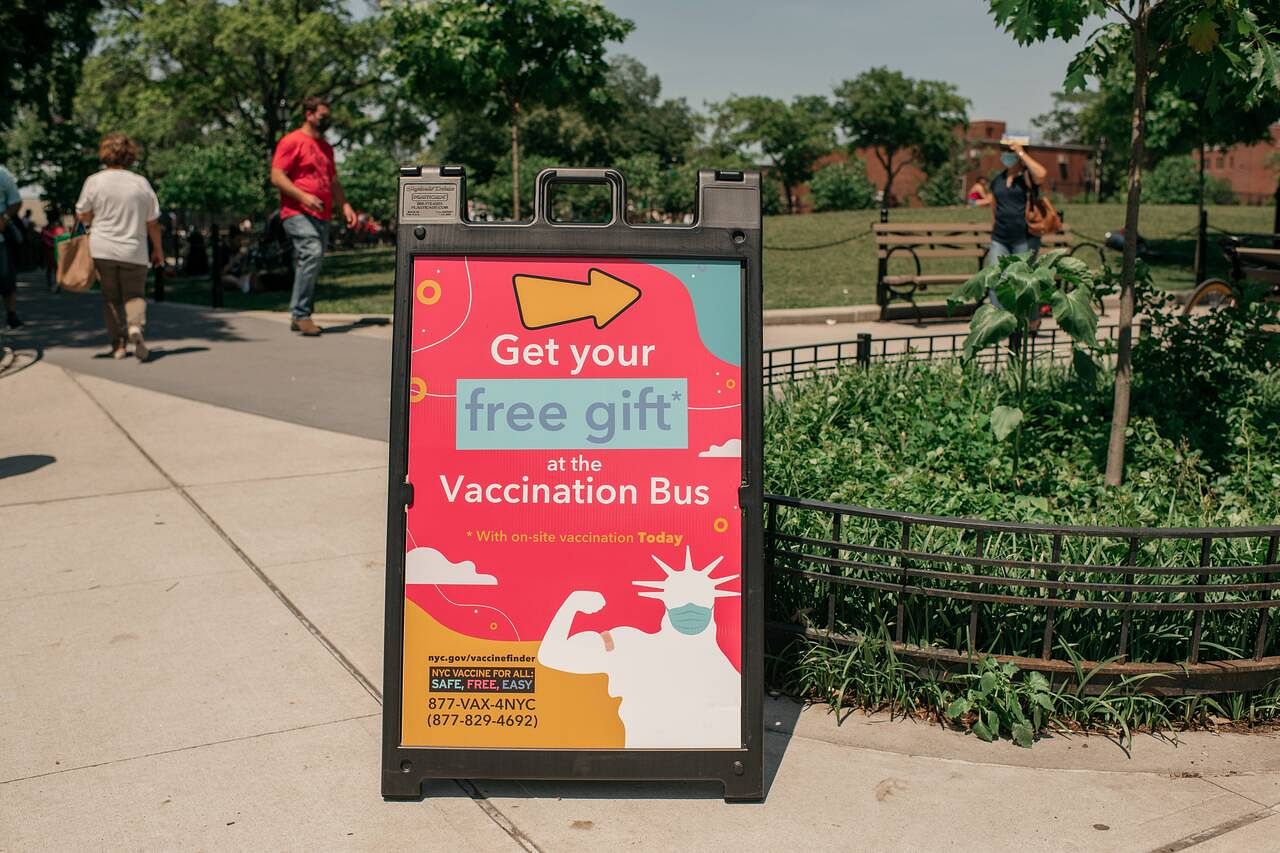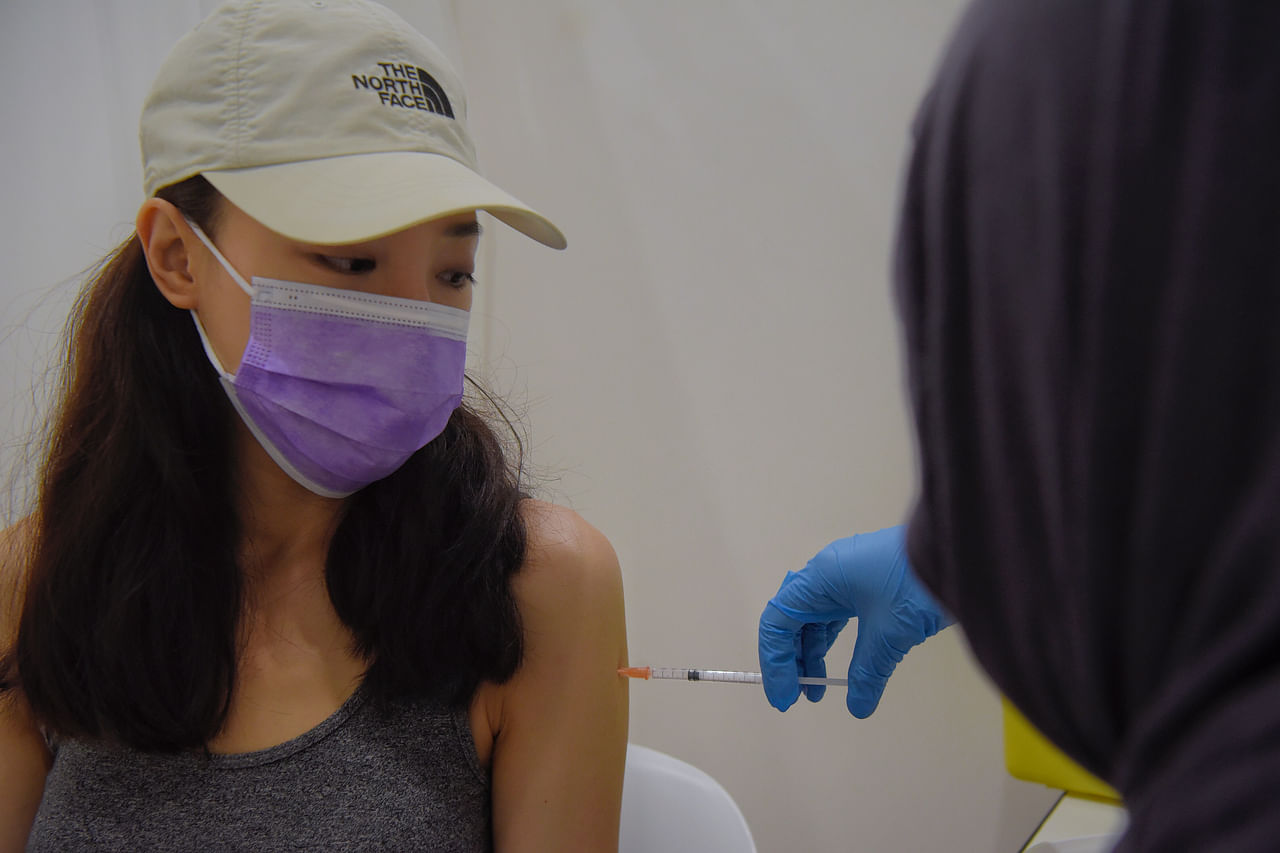Should Singapore offer lottery draws to boost Covid-19 vaccination rate?
Sign up now: Get ST's newsletters delivered to your inbox

A sign encourages passers-by to attend a pop-up Covid-19 vaccine site and block party in New York City on June 5, 2021.
PHOTO: AFP
SINGAPORE - Cows, scholarships and million-dollar lottery draws - governments around the world have dangled these and other incentives in front of their citizens to help them overcome vaccine hesitancy and give national Covid-19 vaccination drives a booster shot.
While Singapore has been making steady progress on the vaccination front, some observers have asked whether offering people additional incentives could help accelerate its pace.
At least one organisation here has embarked on a campaign to offer benefits to Singapore residents who have been vaccinated.
The Minmed Group, which runs four Covid-19 vaccine centres here, has launched an online platform - iamvaccinated.sg - where local businesses can offer discounts and promotions to those who have received their shots.
While some observers believe incentives could nudge those who are still hesitant, others said implementing such a scheme now could be seen as rewarding late adopters and that it could diminish the intrinsic motivation to get the jab out of a sense of social responsibility.
The Singapore Government has so far relied mostly on providing up-to-date and accurate information on the vaccine to convince Singaporeans to take the jab.
Leaders here have also urged citizens to go for the shot. Last Monday, Prime Minister Lee Hsien Loong, in his national address, made a direct appeal to 280,000 seniors who have yet to book a slot to do so.
But other countries have not stopped at educational and information campaigns to convince their citizens to get vaccinated.
In the US state of Ohio, for instance, the state government is incentivising Americans to get vaccinated with cash prizes from a Vax-A-Million lottery totalling US$5 million (S$6.6 million) and another US$600,000 going to scholarships for vaccinated teens.
The idea of providing incentives, including lottery draws, has gained traction among some here, including Associate Professor Jeremy Lim from the National University of Singapore's (NUS) Saw Swee Hock School of Public Health.
Noting that Singapore is grappling with its most severe challenge since independence, he said offering incentives would allow the Government to make the vaccine benefits tangible, short of mandating the shots.
Prof Lim added that such incentives are complementary to robust public health education and engagement.
Albert Winsemius Chair Professor of Economics Euston Quah of Nanyang Technological University said an economic argument can be made to provide incentives for vaccination, as people who have been vaccinated reduce medical and health costs for society.
"The more people are vaccinated, the greater the likelihood that the pandemic will end. Thus, this group of vaccinated people confers a positive external effect on society compared with people who do not get vaccinated," he said.

Some observers have asked whether offering people additional incentives could help accelerate its pace.
ST PHOTO: MARK CHEONG
"(Such incentives) reduce a possible market failure in not leaving such important public health implications and costs to individual decisions per se."
Other observers, such as Associate Professor Lim Poh Lian, director of the High Level Isolation Unit at the National Centre for Infectious Diseases, were more cautious about the signals that incentives could send.
She noted that there are currently more than 40 active Covid-19 clusters in Singapore and that cases have been recorded in malls, tuition centres and public housing. "So, the urgent need to get vaccinated has become quite obvious to most people," she said.
Prof Lim added that financial incentives, as an extrinsic motivator, tend to weaken intrinsic motivation.
"When those who got vaccinated out of a sense of duty (intrinsic motivation) see other people getting cash in order to get vaccinated, they get cynical. The next time you call on them to do something out of duty, they may well ask, 'How much are you going to pay me?'"
NUS sociologist Tan Ern Ser said that while cash would likely help nudge people into doing what they might be reluctant to do, it could also establish an unhealthy expectation.
Yio Chu Kang MP Yip Hon Weng said that offering an incentive for vaccination might send a signal that the vaccines are somehow undesirable or unsafe, hence needing incentives to encourage uptake.
Instead of incentives, he suggested that the Government consider bundling health check-ups with vaccination appointments, or offering the remaining unvaccinated members of the household to be vaccinated together, so that household transmission could be further reduced.
But NUS' Prof Jeremy Lim said concerns about unhappy precedents being set and the public expecting future incentives are unwarranted.
"We are in a crisis situation and we should be bold, doing whatever it takes to get us to the required population vaccination numbers," he said.
Sembawang GRC MP Mariam Jaafar said that while incentives can provide a "short-term boost" to the vaccination rate, multiple strategies including subsidising some alternative vaccines and tailoring communication to specific needs are needed.
A retired tuition teacher, who wanted to be known only as Mrs Chia, disagreed with handing out cash vouchers or lottery tickets to encourage vaccinations.
The 68-year-old had hesitated taking the jab due to concerns about its safety. She decided to get it only in late April after being repeatedly urged by her children.
"I will be very disappointed with the Government if it takes such an approach. The decision to take the vaccine is a serious matter, and we should be educating the public properly about it instead of treating it like some kind of game," said Mrs Chia.
Some incentives being dangled to encourage vaccinations
Ohio is offering lottery draw chances for those who get inoculated against Covid-19, and some other American states have followed suit.
California is offering US$100 million (S$132 million) in US$50 prepaid cards for the next two million newly vaccinated people and US$16.5 million in cash prizes for all vaccinated Californians.
In Oregon and Colorado, those who have received at least one dose of the Covid-19 vaccine by a prescribed date are automatically entered into lottery draws where they can win up to US$1 million.
The Hong Kong authorities have also dangled a vaccine lottery featuring a new flat worth HK$10.8 million (S$1.84 million), which has reportedly led to a surge in vaccine bookings since the lottery was announced on May 28.
Not to be outdone, the mayor of a farming town near Manila has promised to raffle a cow each month from September to get his constituents to take vaccine shots from Russia or China.
Here in Singapore, the Minmed Group recently launched an initiative where residents can enjoy special privileges such as discounts and cash vouchers from merchants by showing their HealthHub vaccination record. The initiative is supported by public healthcare technology agency Integrated Health Information Systems.
At least 40 merchants have joined the initiative so far.
Ms Inez Lim, the founder of Kittea, a tea retailer which is a participating merchant under this scheme, believes life could start going back to a new normal when a significant proportion of the population has been vaccinated.
"Everyone loves a good discount, and if enough brands come on board, the pull factor can be appealing enough to overcome any minor fears people may have about getting their jabs," she said.


